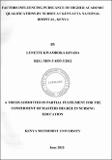| dc.description.abstract | With an unprecedented growth in professional knowledge, rapid changes in health care system, changes in the nurse's role and emergence of new diseases, it is imperative for nurses to pursue higher academic qualification to develop specialized skills to better manage health care. This study aimed at determining factors that influenced nurses to pursue higher academic qualifications at Kenyatta National Hospital. The objectives of the study were to identify personal factors that influence nurses to pursue higher academic qualifications in KNH, establish professional factors that influence nurses to pursue higher academic qualifications in KNH and determine institutional factors that influence nurses to pursue higher academic qualifications in KNH. A descriptive cross-sectional design was adopted for the study in which purposive and systematic sampling were used to select the sample. The sample comprised 166 respondents from a total population of 1590 nurses working at Kenyatta National Hospital. Data was collected over a period of four weeks using self-administered questionnaires. Data was analyzed using version 20 of Statistical Package for Social Scientists (SPSS). The results established that about half of the nurses (48%) were initially ECN qualified but had upgraded while 67.7% had upgraded from their initial qualifications. Among the factors that influenced nurses to upgrade were desire to improve knowledge and skills (r=0.916, p-value 0.006), empowerment(r=0.822, p-value 0.021), flexibility of the mode of study(r=0.809, p-value 0.000) and distance of the learning institution (r=0.791, p-value 0.019). The study concluded that family responsibilities, lack of sufficient time, constant changes in the profession, work study balance, heavy work load and getting study leave were the key challenges. The most preferred modes of study were part-time and distance learning. In addition, age remained an important factor influencing nurses to pursue further studies.
From the foregoing findings and conclusion it was recommended that the academic institutions should develop upgrading programs with flexible modes of study to cater for the working students. Also, Health care institutions should offer employees incentives for upgrading and a need to revamp nursing education policies and curricula to encourage modern methods of learning. | en_US |

